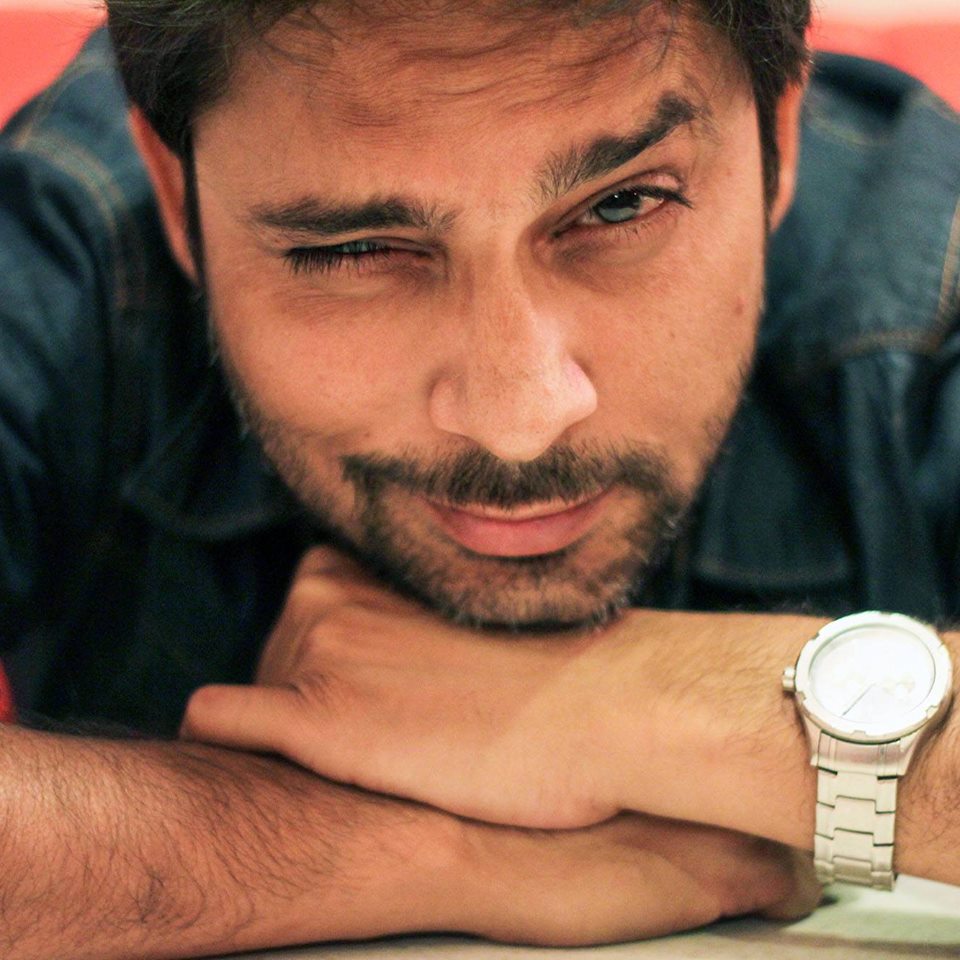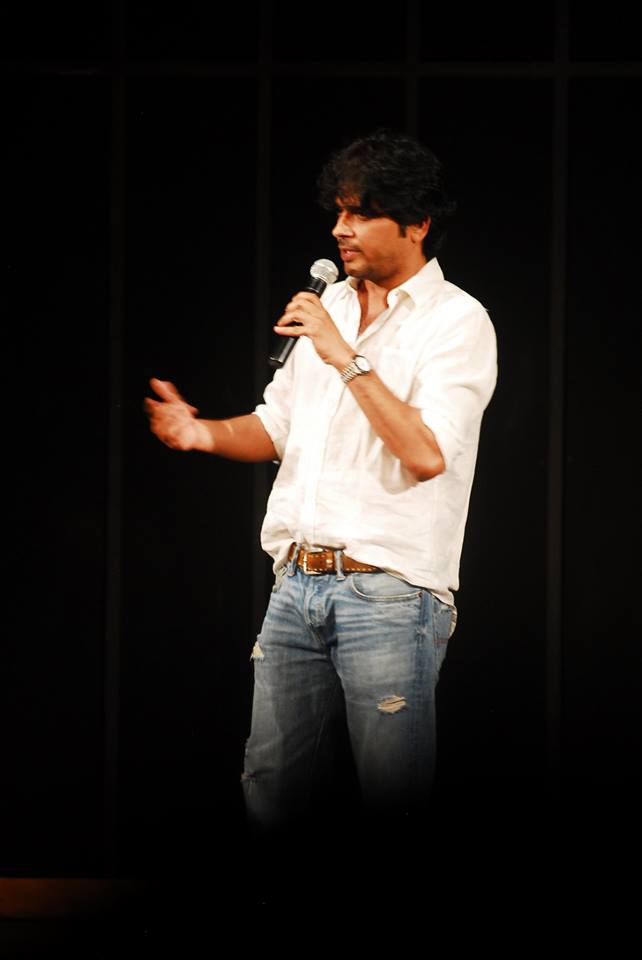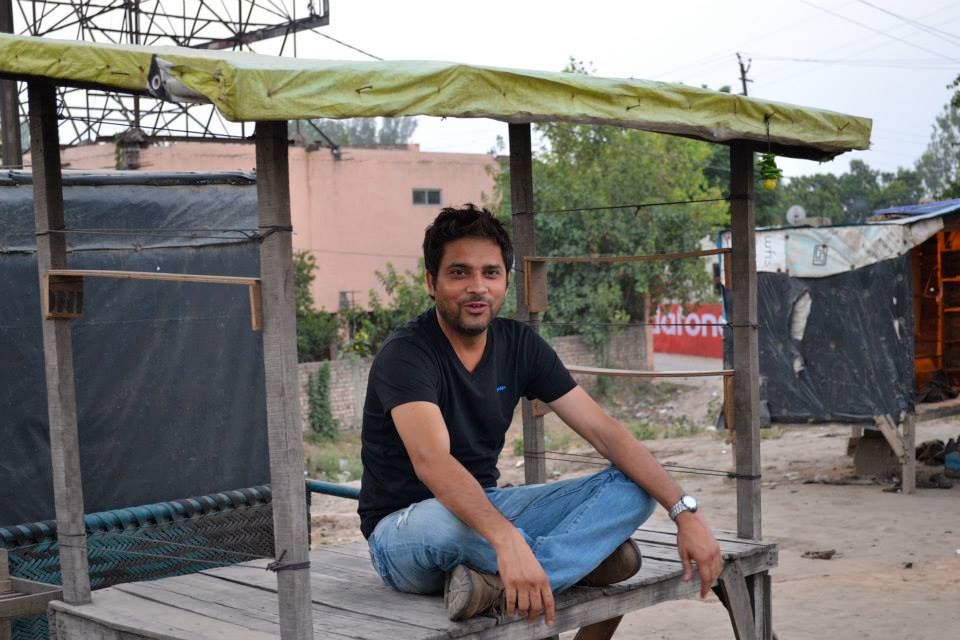Sanjay Rajoura’s performance with Rahul Ram at May Day Bookstore
There’s a nervous energy to Sanjay Rajoura. As one of North India’s most unsettling stand-up comedians, he’s pretty unsettled himself. It is not an easy terrain in which he works and, most importantly, his comedy is not the kind of mindless, sexist, racist, misogynist drivel belted out by the likes of AIB. Indeed, it is comedy that pulls you out of your comfort zone, makes you uncomfortable. He performs for all kinds of audiences and often there are long, awkward silences instead of laughter because the joke has cut too close to the bone. The joke is on the audience and they know it.
Yet there is nothing of the patronising or holier-than-thou Leftie in Rajoura. Indeed, he is utterly lovable and one of the lads, so it is hard for people to stop liking him even when he’s just pulled the rug from under their feet. He speaks mainly in Hindi, putting paid to the elitist charge against much stand up comedy which is in English and, as a Jaat from a small village in Uttar Pradesh’s Bulandsheher, the smattering of English in his jokes is in an accent that makes him utterly exotic to the English-speaking snobs and makes your average North Indian Joe feel reassured.
But that reassurance does not last for long as he takes on, in an unassuming and cumulative way, the family, caste, the community, the corporate world, the media and the state. It is Left wing comedy, to be sure: anti-casteist, anti-communal, anti-nationalist, anti-capitalist, some of it even feminist. All in all, not the sort of fare you expect from an Uttar Pradeshi, Hindu, middle class Jaat. So how did Sanjay Rajoura come into being?
Rajoura comes from regular middle class, middle caste stock and his parents, like many others, came to Delhi to make it big. Aspiration was deadly. He shows me the protruding bones beneath both of his thumbs and says his father broke those bones because he did not stand first in class. Like all good middle class boys, he joined the IT industry after a degree in Engineering and went off to the Silicon Valley to make his millions. But something snapped there. “I was frustrated with the futility of my work. I did not like the exploitative and regressive corporate culture one bit, specially the Indian corporates. I had started to feel that I do not fit in and do not belong here. I told myself, I can’t do this for the rest of my working life, so I decided to walk away,” he says.
Rajoura is a man of instinct and impulse. He adds: “At that time I had no ideas or plans for myself, or what I would do but I was pretty clear about what I don’t want to do.” He quit, gave it all up and came back. “I made enough money to buy a house (he lives in Noida), a car (he drives a monstrous SUV) and that was it,” Rajoura says. He knew he would not be able to fend off his parents (who live down the road) if he had not built an independence from them. That instinct is his trump card in the stand up he does and he takes on everything on the basis of it.
Family is an institution he despises and not just because he suffered the wages of being the weakest link in it as a child, and the pressure of it as a son, but because he sees in the institution the seeds of all that is obnoxious about the society we live in. This makes his critique of it both something people cannot evade but also something, given the sacrosanct status of the institution in India, most cannot stomach. His pieces include stinging critiques of children left by their parents (“kancho ki tarah chod dete hai” – “They let them loose like marbles from a palm”) in malls and restaurants where they wreak havoc, and vicious puncturing of the ’You-have-to-settle-down’ spiel that every middle class boy or girl gets. There’s no settling down for Sanjay Rajoura.
He questions the aspirations of parents, the violence they visit on their children and the young in his audience (and his audiences are mainly young) relate to this but often do not want to acknowledge it. There is no bitterness in what Rajoura says but he pulls no punches either. In a recent performance at a progressive event mourning one year of Narendra Modi’s government, he opened by saying that we do not question our Prime Minister because we have been brought up by a familial ideology that does not allow us to ever question our fathers. It is the kind of basic psychoanalytic insight that beats even our smartest social analysts and it is tossed off with characteristic Rajoura bravura. The laughter is nervous.
But the detours he takes before he reaches the nation are even more powerful; stuff no one, least of all audiences in a South Delhi pub, want to hear. “I really think caste is the most important thing in our society,” says Rajoura. ‘It determines everything – what we eat, whom we deal with, whom we marry, everything.” One of his most powerful pieces is against his own community, the Jaats. It is a daring thing to do as the Jaats (across the states of Uttar Pradesh, Haryana, Rajasthan, Punjab) are not only mindlessly proud of themselves as a community, given that that is the staple diet on which they are brought up, but also do not take criticism of their community lightly. Pint-sized and unimposing, Rajoura isn’t your average Jaat behemoth either. But he is one of them and they know what he’s saying has more than a grain of truth in it.
His use of the pronoun ‘We’ helps. That is one of the most disarming qualities Rajoura possesses — the ability to implicate himself in his critiques. “I am heterosexual,” he says, “but I realise this is what we are taught to be. Every message, ever billboard, every movie, every TV programme is telling us to be heterosexual, so what do you expect? Whereas I think none of us fit into these categories so neatly, these categories are meaningless,” he says, a disarming smile breaking across his handsome face. You can’t help like the guy and this is what his audiences sense as well even if he is lambasting their, and his own, community, their very foundations.
From community to nation is another link Rajoura makes via a critique of corporate capitalism. Having worked in the IT industry, he knows the culture there intimately so once again, is humour bears the traces of his complicity. This is no outsider speaking from on high. He mocks the ideology behind corporate activities in firms, is brilliant on malls and peels off the shine on corporate culture to show some old cultural variables at work – familism, feudalism – beneath the surface.
He has visited Pakistan more than once and has been viewed with suspicion on both sides. He mocks both India and Pakistan brilliantly. He re-works Hindi film songs to expose the stupidity of nationalist ideology on both sides. Rajoura, Bombay-based political comedian Varun Grover (something of a brother-in-arms) and Indian Ocean singer Rahul Ram re-wrote the famous song from the Hindi film Padosan ‘Mere saamne waali khidki me’ – ‘In the window opposite me’) as part of their recent show Aisi Taisi Democracy which is making waves across cities and even inspired a friendly Pakistani rejoinder. This is Rajoura’s addition to it which he performed in Pakistan:
yahan bomb girana asaan hai, par visa milna mushqil hai
jamhuriyat sad rahi jailon main, aur sarkaron main qatil hain
bas do families ki chandi hai, wahan Bhutto hai yahan Gandhi hai
It is easy to drop bombs here but difficult to get visas
The poor rot in jails and murderers run the states
Only two families have a great time, the Bhuttos there, the Gandhis here
It is a serious business this madness between the two countries, the utter mindlessness of which can only be fathomed through comedy. But Rajoura’s comedy is also aware of the violences of nationalism that form the dark underside of this humour. Sabeen Mahmud, the peace activist from Pakistan who was brutally murdered this year, was a dear friend. At an event to commemorate her one month after she was shot in Delhi recently, Rajoura was sombre but still ready to make people laugh.
Rajoura does not dwell on adversity or misery too much. He’s seen too much to care about being maudlin. He earns irregularly and haphazardly but is convinced he will never go hungry. “Daal roti tho mil hi jaati hai kahi se, mil hi jaayegi” (I can get lentils and bread from somewhere or the other) he says charmingly. He is not invested in the idea of futurity any more.
He does not believe in marriage but, at 42, Rajoura like an adolescent boy about new loves. Indeed, one of the things he says is that he learnt all he has from “the wonderful, extraordinary women in my life.” For an Indian man to admit that is amazing enough.”My first real relationship was with a woman and I learnt all I know from her. And from several women after her.” This acknowledgement of his debt to women is what gives his comedy a lightness of touch. There’s no testosterone-driven clubfootnedness to it. In an extremely precarious world, leading an extremely precarious existence, Rajoura is stable in how he floats.
But the qualities of his style, pace and tone are all his own. He does not rehearse or plan pieces in an organised way. He goes up on stage and plays it by ear. He is not so much interested in, let alone determined by, his audience.”I perform for myself,” he says, “I am not thinking about what the audience wants or what it is expecting.” He is constantly critical of himself and his performances, saying that he was not good enough or that this or that was flat. There is no smugness to his craft and if it appears effortless and spontaneous it is actually because it is precise in its inflection and intuitive in its grasp of the social temperature.
That Rajoura knows the contexts of which he is speaking so well (North India, Hindi cinema, class, caste) means that his sense of how to say what he has to say and indeed what to say is almost instinctual. That he is not affiliated to any political party and is certainly no institutionalised Leftie means that there is no prepared programme, no party line. Nothing is sacred but there is a great humaneness to his humour and this comes from the self-implication spoken of above. Rajoura takes the piss not only with others but also with himself.
At the one year of Modi event, he began by saying that we should not demonise Modi because we created him, he is one of us, he is of our design. Rajoura, along with performers like Varun Grover, are unique voices in the Indian stand-up comedy scene because they talk about things most stand-up comedy does not talk about. Mainstream (read mindless) stand-up comedy in English would not touch caste or class or community or nationalism with a bargepole unless it was to make personalised fun of Dalits (AIB’s pathetic jokes about Mayawati, for example), crack sexist and misogynist jokes (practically every AIB joke), make racist jokes (AIB’s obsession with dark skin colour) and never ever question community (AIB apologised to the Catholic Church) or nation.
That Rajoura and Grover do not see themselves as fringe figures but work with the Hindi film industry (Rajoura has written for films he never got paid for but he’s still cool about it), do not shy from performing at corporate gigs and do not run away from dialogue with any one makes them very special and very courageous people. Both have come under attack and both have been muzzled but they are not about to give up.
The true comedian is a satirist and being a satirist in the conformist, jingoist and violent consensus of neoliberal India is not easy. Rajoura looks frayed at the edges as he orders his tenth beer. He apologises for taking me out from the air-conditioned comfort of some hideous Khan Market dig into the furnace-like balcony at regular intervals so he might smoke yet another cigarette.
He is planning to write a book, no two, writing a script, no two, and is bursting with ideas for several things. He says things middle class India does not want to hear, the nation-state does not want to hear. But he’s not rattled. There’s a nervous energy to Sanjay Rajoura.
Also watch a part of Sanjay Rajoura’s performance at the event Towards Equality here.







